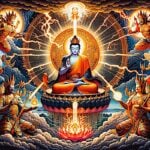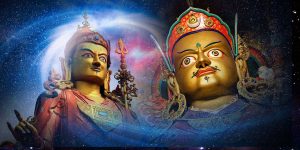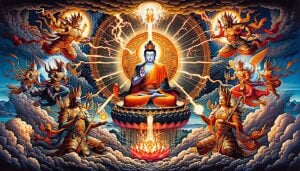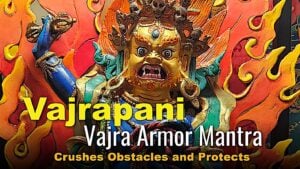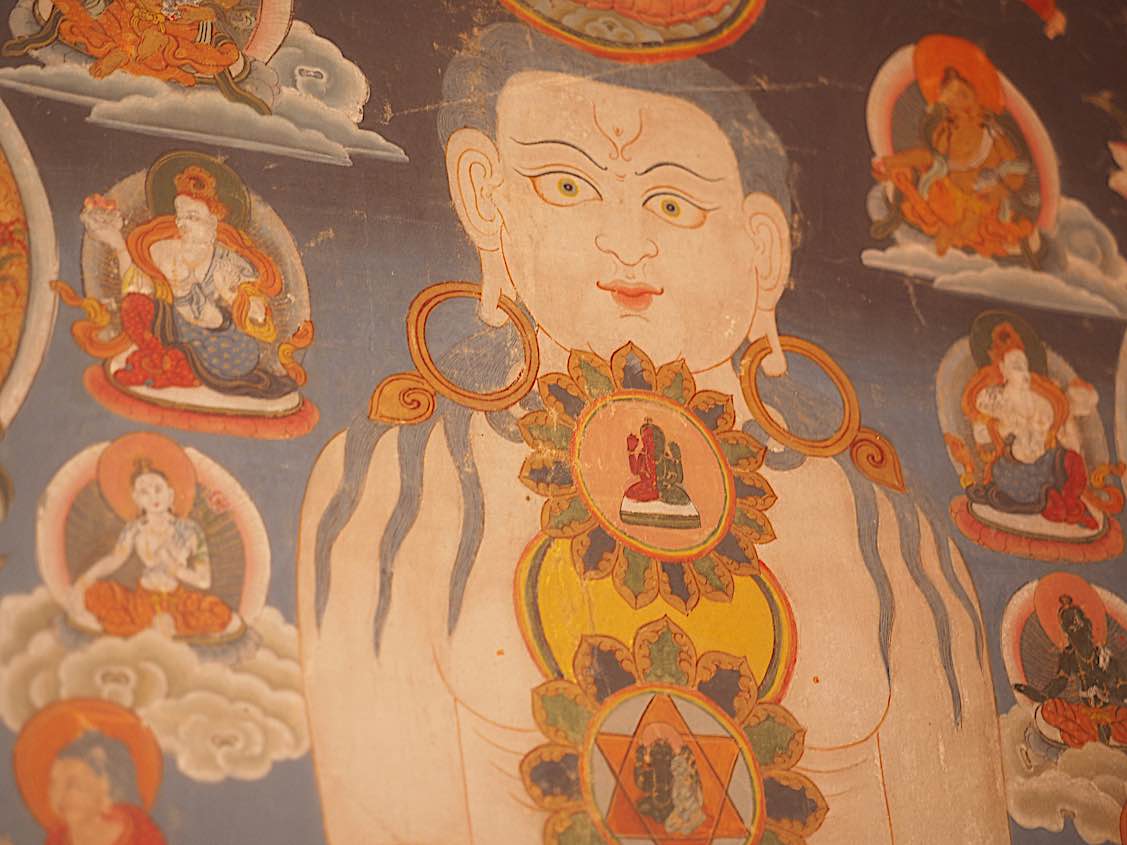Baalapandita Sutta: Buddha Teaches How to Recognize the Fool and the Wise One — English
I heard thus:
At one time the Blessed One lived in the monastery offered by Anaathapindika in Jeta’s grove in Saavatthi. The Blessed One addressed the Bhikkhus from there.
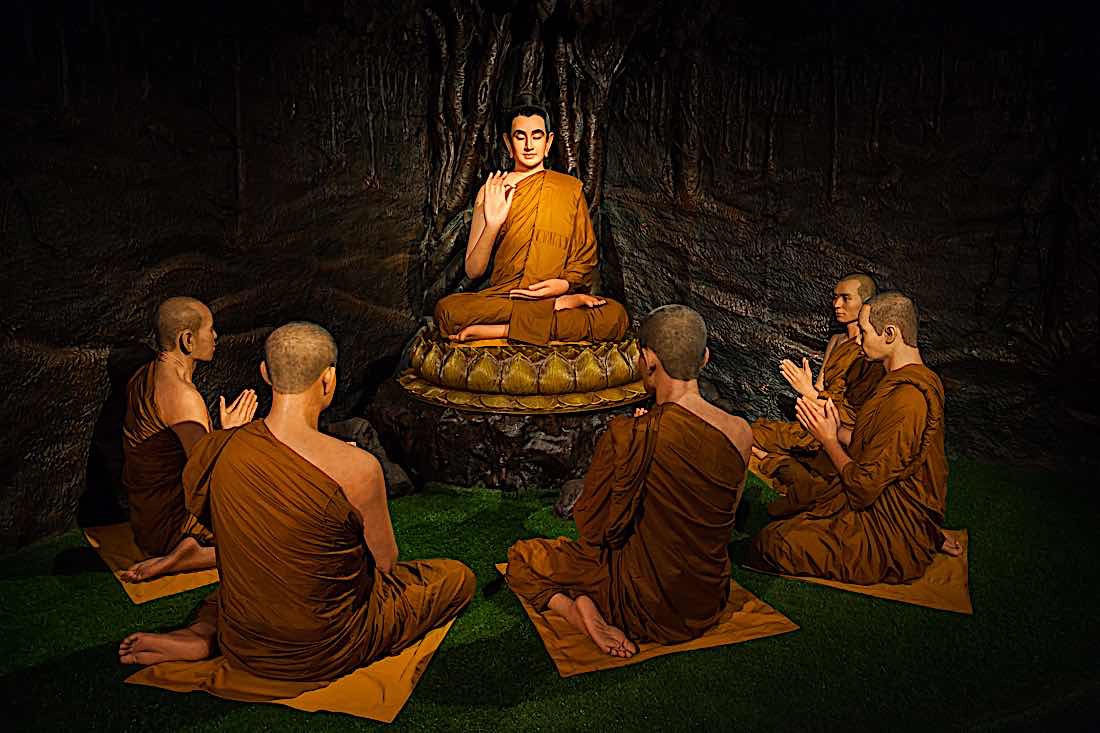
The three marks of the fool
‘Bhikkhus, these three are the marks, characteristics and attainments of the fool. What are the three?
The fool has foolish thoughts, foolish words and foolish actions.
If the fool was not with foolish thoughts, words and actions, how are the wise to know this good person is a fool, an unworthy one. Since the fool thinks, speaks and acts foolishly, the wise know he is a fool. The fool experiences unpleasantness and displeasure here and now in three ways. Bhikkhus, if the fool is with a crowd, in the street corner or a junction, and if the people there were talking about some current topic, and if he destroyed living things, took the not given, misbehaved sexually, told lies and took intoxicating drinks, it occurs to him: “These things the people are talking are evident in me too.” This is the first instance that the fool experiences unpleasantness and displeasure.
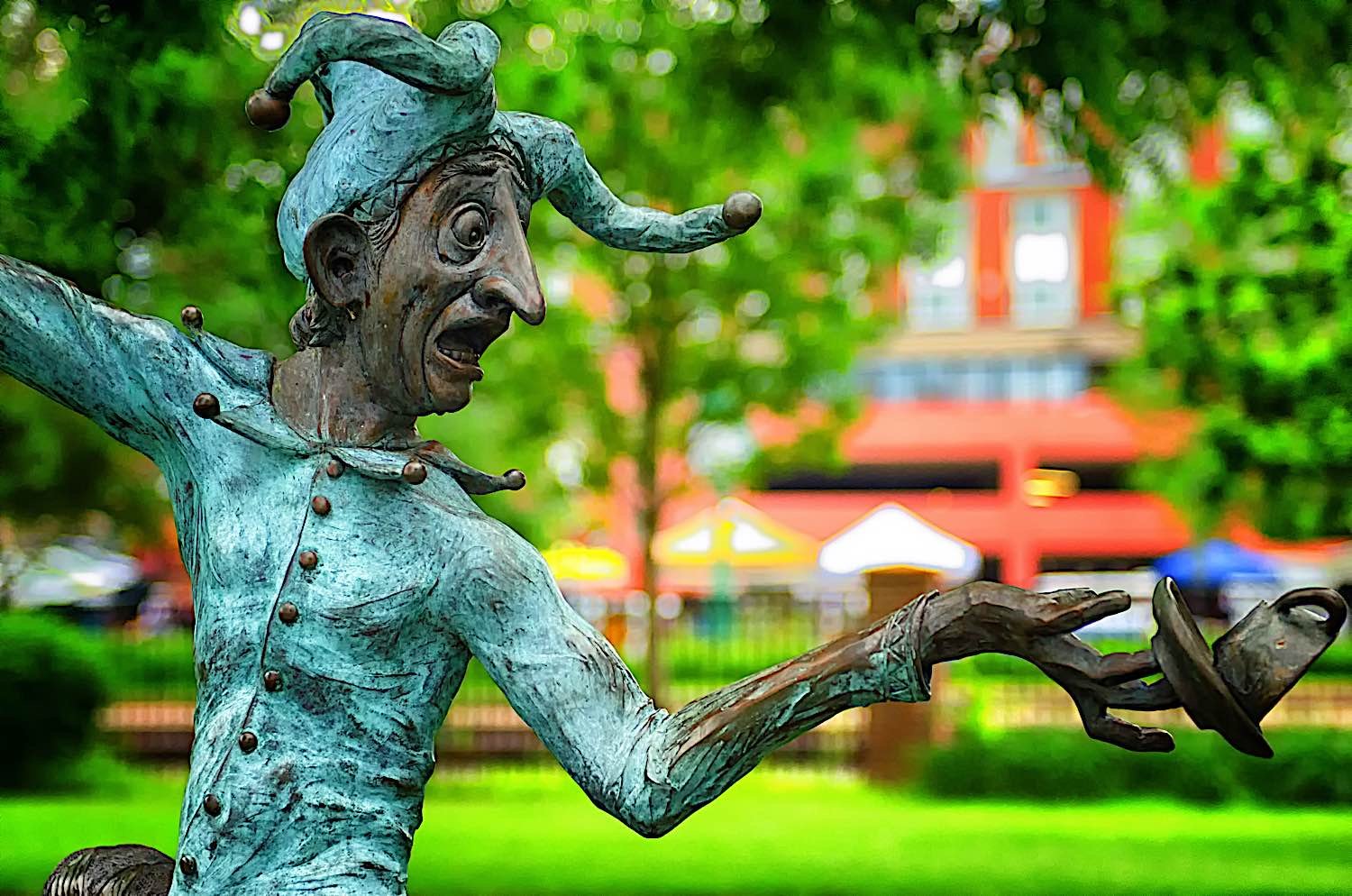
Again, Bhikkhus, the fool sees an offender taken hold by the king and given various kinds of torture, caned and whipped, flogged with the jungle rope, flogged with the soiled stick, hands severed, legs severed, or both hands and legs severed, ears and nose severed, put in the boiling gruel pot, shell tonsured, put in Raahu’s mouth, garlanded with the blazing garland, hands scorched, the bark dress given, put with snakes, putting hooks in the flesh, cutting pieces of flesh from the body, driving a spike from ear to ear, beating to make the body like straw, immersing in the boiling oil, giving to the dogs to be eaten, raising on a spike alive until dead, and cutting the neck with the sword. Bhikkhus, then it occurs to the fool, for the reason of doing evil this robber, this evil doer is punished. If the king gets hold of me, I too will be subjected to these same punishments. This is the second instance that the fool experiences unpleasantness and displeasure.
Again, Bhikkhus, when the fool is relaxed on a chair, on the bed or on a cover on the floor, he thinks of his misbehaviors by body, speech and mind. At such times they press on him heavily. Like the shadow of a huge mountain peak, would fall on the earth heavily in the evening…In the same manner when the fool is relaxed on a chair, on the bed or on a cover on the floor, he thinks of his misbehaviors by body, speech and mind. At such times they press on him heavily. Bhikkhus, then it occurs to the fool. ‘I did not do good and create merit. I didn’t dispel the fear of the frightened, I did evil bloody acts and later I will reap their results.’ He grieves, laments, beats his breast and comes to great bewilderment of mind. Bhikkhus, this is the third instance that the fool experiences unpleasantness and displeasure.
Bhikkhus, the fool misbehaving by body, speech and mind, at the break up of the body after death, goes to decrease, is born in hell. Saying it rightly that hell is completely unwelcome and disagreeable. It is not easy to give a comparison for that unpleasantness.
Then a certain Bhikkhu said. ’Venerable sir, is it possible to give a comparison?’
The Blessed One said, ‘It is possible Bhikkhu. An evil doer, a robber is taken hold and shown to the king and is told, ‘Great king, this is a robber, an evil doer, mete the suitable punishment to him.’ Then the king would say. ’Good one, whip this person six thousand times in the morning.’ He is whipped six thousand times in the morning. In the mid day the king would ask ‘Good one, how is that man?’ ‘Great king he is alive as he was.’ Then the king would say, ’Good one, whip this person six thousand times in the midday.’ He is whipped six thousand times in the mid day. In the evening the king would ask ‘Good one, how is that man?’ ‘Great king he is alive as he was.’ Then the king would say. ’Good one, whip this person six thousand times in the evening.’ He is whipped six thousand times in the evening. Bhikkhus. would that man whipped six thousand times three times a day feel unpleasant and displeased?’
‘Even if given sixty whips, he would feel unpleasant and displeased, so what to speak of it when given six thousand whips three times a day’?
Which is bigger in size: the stone or the mountains?
Then the Blessed One took a small stone that fitted his fist and addressed the Bhikkhus. ‘Bhikkhus, which is bigger in size, the stone in my fist or the Himalaya mountains?’
‘Venerable sir, the stone in your fist cannot be reckoned as a comparison, not even as a quarter, nor even as a sign for the Great Himalayas’

‘In the same manner Bhikkhus, the unpleasantness and displeasure experienced on account of giving six thousand whips three times a day cannot be reckoned as a comparison, not even as a quarter, nor even as a sign for the unpleasantness and displeasure experienced in hell. The warders of hell give him the fivefold binding. That is two hot iron spikes are sent through his two palms, and two other hot spikes are sent through his two feet and the fifth hot iron spike is sent through his chest. On account of this, he experiences sharp piercing unpleasant feelings. Yet he does not die, until his demerit finishes.
Next, the warders of hell conduct him and hammer him. On account of this, he experiences sharp piercing unpleasant feelings. Yet he does not die, until his demerit finishes. Next, the warders of hell take him upside down and cut him with a knife. On account of this too he experiences sharp piercing unpleasant feelings. Yet he does not die, until his demerit finishes. Next, the warders of hell yoke him to a cart and make him go to and fro on a ground that is flaming and ablaze. On account of this too he experiences sharp piercing unpleasant feelings. Yet he does not die, until his demerit finishes. Next the warders of hell make him ascend and descend a rock of burning ambers. On account of this he experiences sharp piercing unpleasant feelings. Yet he does not die, until his demerit finishes.
Next the warders of hell throw him upside down into a boiling, blazing pot of molten copper. There he is cooked in the molten scum, and he on his own accord dives in, comes up and goes across in the molten pot. On account of this too he experiences sharp piercing unpleasant feelings. Yet he does not die, until his demerit finishes. Next the warders of hell throw him to the Great Hell. Bhikkhus, the Great Hell is square and has four gates. It’s divided into two and is enclosed with an iron wall. The top is closed with an iron lid. The floor spreads up to seven hundred miles and it stands there everyday.
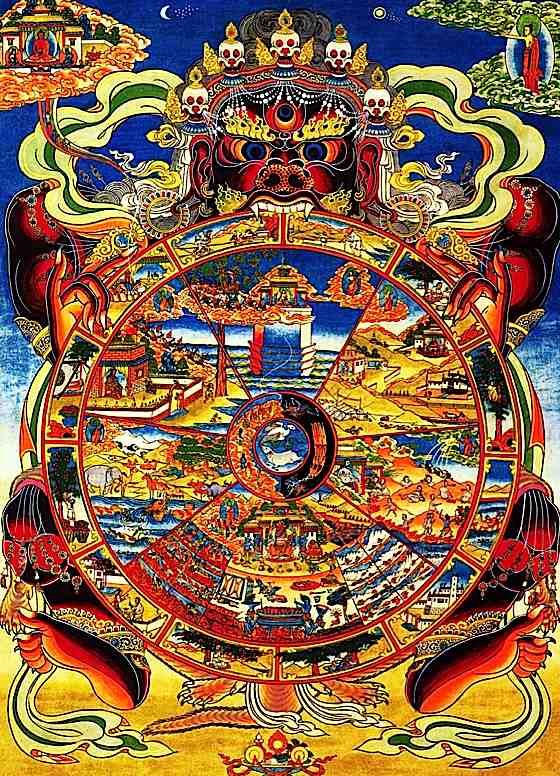
The Unpleasantness of Hell
I may explain the unpleasantness of the hell in various ways, yet it is not easy to explain that unpleasantness completely.
Bhikkhus, there are beings that go on their fours and grinding grass dry or wet with their teeth, eat it. Who are such beings? They are horses, cattle, donkeys, goats, deer or any other animals that go on their fours and eat grass. The fool greedy for tastes do evil things and after death are born in the company of the four footed and eat grass.
Bhikkhus, there are animals that eat excreta (feces). They run sniffing the smell of excreta, thinking we will eat this and that, like the Brahmin that runs for the smell of a sacrifice thinking we will eat here and there. In the same manner animals that eat excreta run sniffing the smell of excreta, thinking we will eat this and that. Bhikkhus, what are the animals that eat excreta? They are cocks, pigs, dogs, foxes and any other animals that eat excreta. The fool greedy for tastes do evil things and after death are born in the company of the animals that eat excreta.
Bhikkhus, there are crawling things that are born, live and die in the dark…Bhikkhus, what are the crawling things that are born, live and die in the dark? Beetles, worm maggots, earthworms and similar crawling things are born, live and die in the dark. Fools greedy for tastes do evil things and after death are born in the company of those born in the dark.
Bhikkhus, there are things that are born, live and die in the water…Bhikkhus, what are the things that are born, live and die in water? Fish, turtles, crocodiles and similar beings are born, live and die in water. Fools greedy for tastes do evil things and after death are born in the company of those born in water.
Bhikkhus, there are things that are born, live and die in excreta (feces)…Bhikkhus, what are the things that are born, live and die in excreta? Things that are born live and die in rotten fish, in rotten flesh, in rotten bread, in a dirty village pool. Fools greedy for tastes do evil things and after death are born in the company of those born in the company of those who live and die in excreta.
I may explain the unpleasantness of the animal world in various ways, yet it is not easy to explain that unpleasantness completely.
Bhikkhus, a man would throw into the ocean a plowshare with a single hole in it. Then with the eastern winds, it would be carried west and with the western winds carried east. With the northern winds it would be carried south and with the southern winds carried north. Then there is a blind turtle in the depths of the ocean and it comes up to the surface after the lapse of a hundred years. Bhikkhus this turtle with one eye to see, would he put his neck in the plowshare and yoke it to the hole to see light?’
‘Venerable sir, it would happen after the lapse of a very long time.’
‘Bhikkhus, it is more likely that the blind turtle would put his neck in the plowshare and yoke the eye to the hole to see light rather than the fool once fallen to hell would gain humanity.
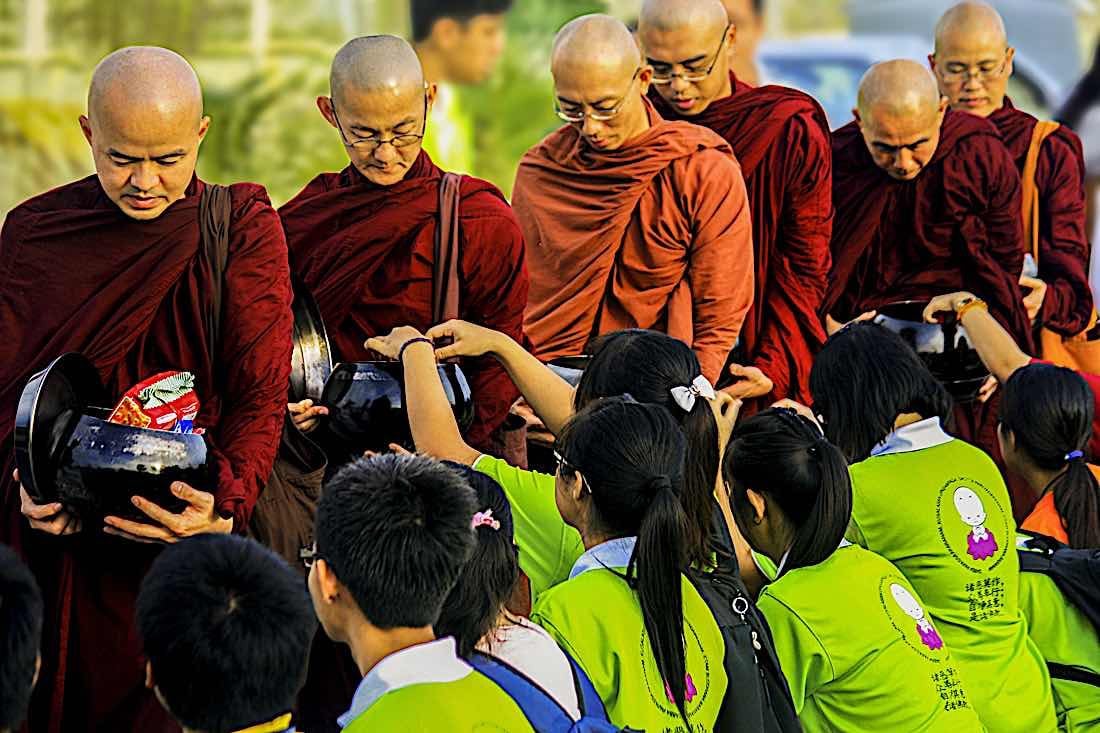
No Righteous Living, Good Conduct, Merit or Pleasant Mind
What is the reason? Here, there is no righteous living, good conduct, merit or a pleasant mind. Here they eat each other and the weaker one is eaten up. Bhikkhus, even if the fool regains humanity after a very long time he is born in a low clan such as with the out castes, the hunters, with the bamboo weavers, chariot builders, rubbish collectors or in such other low family. Born into a poor family without eatables, drinks and clothing, he gains them with difficulty. He too is not with pleasant appearance and has a deformed body and suffers with many ailments, either blind, deformed, lame or paralyzed, or he does not gain eatables, drinks, clothes, conveyances, flowers, scents, ointments, beds, dwellings and illuminations. He misbehaves by body, speech and mind and after death goes to decrease and is born in hell.
Bhikkhus, it is like the gambler, who at the first throw loses his sons, wife and all his wealth and is further pursued. That unlucky throw on account of which the gambler loses his sons, wife and all his wealth is much better than the fool misbehaving by body, speech and mind who would after death be born in hell. Bhikkhus, now the fools’ sphere is completely told.’
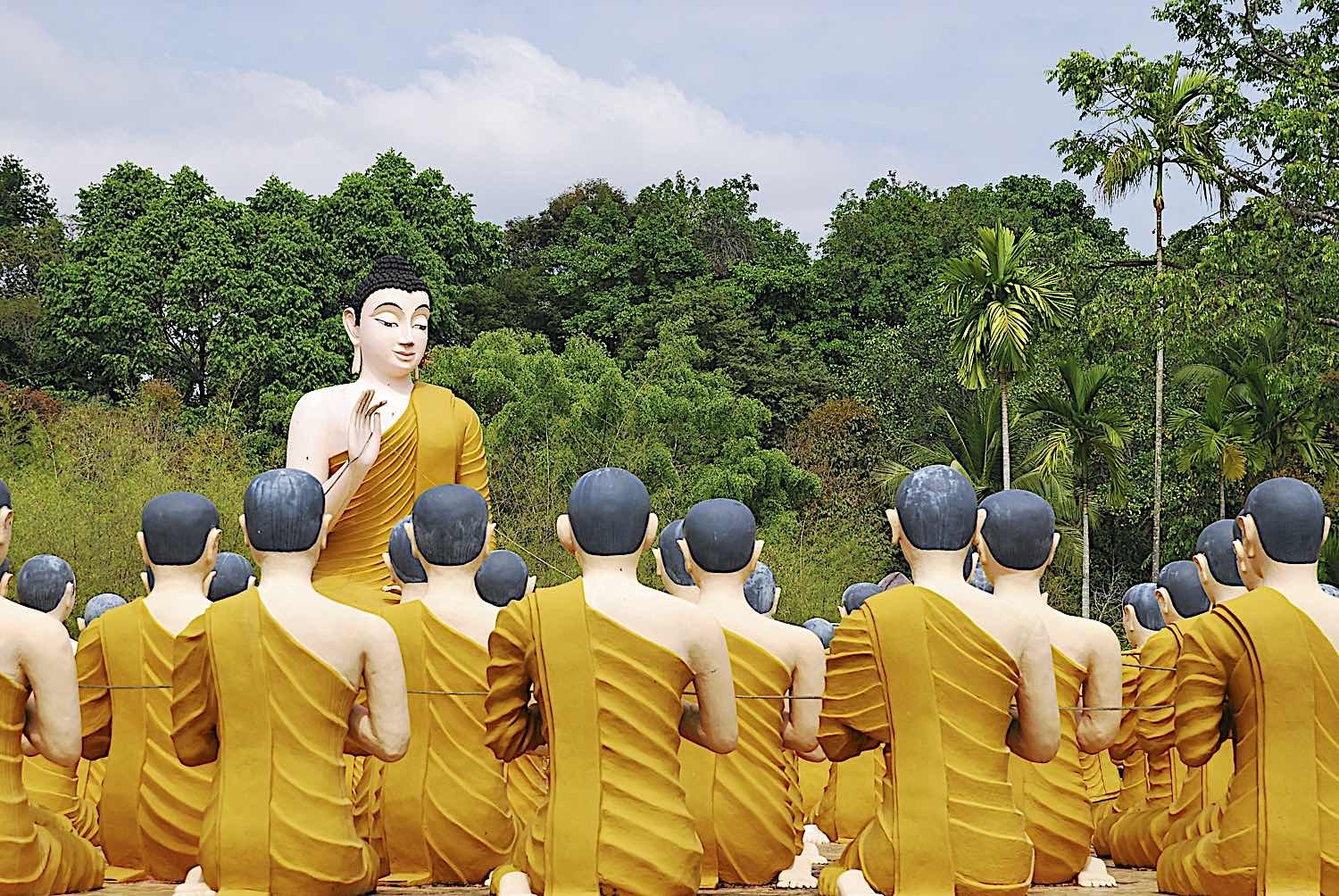
Three Marks of a Wise One
‘Bhikkhus, these three are the marks, characteristics and attainments of the wise one. What are the three? The wise one thinks for the well being, speaks good words and acts wisely…If the wise one was not with wise thoughts, words and actions, how are the wise to know this good person is a wise one, a worthy one. Since the wise one thinks, speaks and acts wisely, the wise recognize him as a wise one. The wise one experiences pleasantness and pleasure here and now in three ways. Bhikkhus, if the wise one is with a crowd, in the street corner or a junction, and if the people there were talking some current topic, and if he abstained from destroying living things, did not take the not given, did not misbehave sexually, did not tell lies and did not take intoxicating drinks, it occurs to him. ‘These things the people are talking I too, know of these things. This is the first instance that the wise one experiences pleasantness and pleasure.’
Again, Bhikkhus, the wise one sees an offender taken hold by the king and given various kinds of torture caned and whipped, flogged with the jungle rope, flogged with the soiled stick, hands severed, legs severed, or both hands and legs severed, ears and nose severed, put in the boiling gruel pot, shell tonsured, put in Raahu’s mouth, garlanded with the blazing garland, hands scorched, the bark dress given, put with snakes, putting hooks in the flesh, cutting pieces of flesh from the body, driving a spike from ear to ear, beating to make the body like straw, immersing in the boiling oil, giving to the dogs to be eaten, raising on a spike alive until dead, and cutting the neck with the sword. Bhikkhus, then it occurs to the wise one, ‘for the reason of doing evil this robber, or evil doer is punished. These things are not evident in me. I too see these as evil.’ This is the second instance that the wise one experiences pleasantness and pleasure.
Again, Bhikkhus, when the wise one is relaxed on a chair, on the bed or on a cover on the floor, he thinks of his good conduct by body, speech and mind. At such times they press on him heavily. Like the shadow of a huge mountain peak, would fall on the earth heavily in the evening…In the same manner when the wise one is relaxed on a chair, on the bed or on a cover on the floor, he thinks of his good conduct by body, speech and mind. At such times they press on him heavily. Bhikkhus, then it occurs to the wise one, ‘I did not do demerit, I dispelled the fear of the frightened, I did no evil bloody deeds, I created merit, and later I will reap their results.’ He does not grieve, lament, beat his breast and come to bewilderment of mind. Bhikkhus, this is the third instance that the wise one experiences pleasantness and pleasure.
Bhikkhus, the wise one conducting well by body, speech and mind, at the break up of the body after death, goes to increase and is born in heaven. Saying it rightly that heaven is completely welcome and agreeable. It is not easy to give a comparison for that pleasantness.
Then a certain Bhikkhu said. ’Venerable sir, is it possible to give a comparison?’
The Blessed One said, ‘It is possible Bhikkhu. It is like the pleasantness and pleasure experienced by the Universal Monarch endowed with the seven treasures and the four powers.
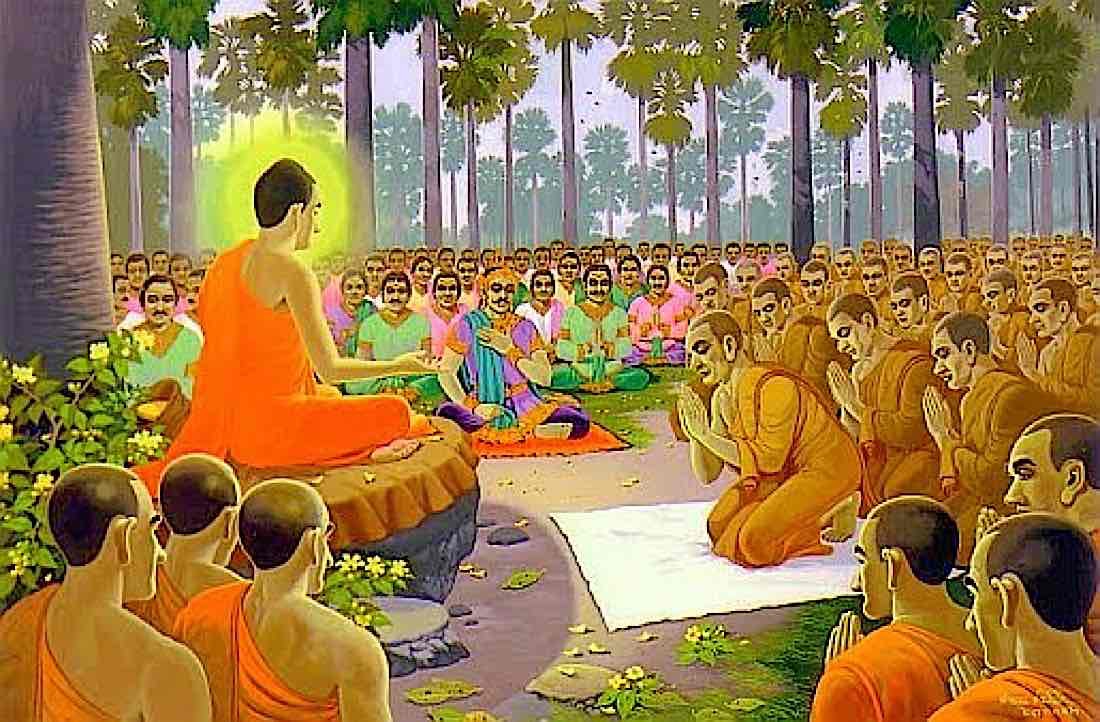
What are the seven treasures?
Bhikkhus, the consecrated warrior king on the full moon day washes his hair, bathes and observes the eight precepts, on the top most story of his palace, then the heavenly wheel treasure appears to him, with the thousand-fold spokes, axle and knob complete in every way. Seeing the wheel treasure it occurs to the consecrated warrior king, ‘I have heard it said that when the consecrated warrior king on the full moon day washes his hair, bathes and observes the eight precepts, on the top most story of his palace, the heavenly wheel treasure appears to him, with the thousand-fold spokes, axle and knob, complete in every way. Have I become the Universal Monarch?’ Then the consecrated warrior king getting up from his seat, takes the golden water spout in his left hand and the wheel treasure in his right hand sprinkles water on the good wheel treasure.
Bhikkhus, then the wheel treasure goes to the east even without a word, together with the king and the fourfold army. In whatever region the wheel treasure stops, there the king and the fourfold army dwells. The subordinate kings in the east approach the Universal Monarch and tell him. ‘Welcome great king, you have come at the right time, please advise us.’ The Universal Monarch says, ’Life should not be destroyed, the not given should not be taken, sexual misconduct should not be indulged in, lies should not be told and intoxicating drinks should not be taken. Enjoy your kingships as you have done.
Thus they become the subordinate kings of the Universal Monarch. The wheel treasure goes to the east as far as the eastern ocean. Then it turns and goes to the south…as far as the southern ocean…Then it turns and goes to the west…as far as the western ocean. Then it turns and goes to the north…Even without a word, together with the king and the fourfold army. In whatever region the wheel treasure stops, there the king and the fourfold army dwells. The subordinate kings in the north approach the Universal Monarch and tell him, ‘Welcome great king, you have come at the right time, please advise us.’ The Universal Monarch says, ’Life should not be destroyed, the not given should not be taken, sexual misconduct should not be indulged in, lies should not be told and intoxicating drinks should not be taken. Enjoy your kingships as you have done. Thus they become the subordinate kings of the Universal Monarch. The wheel treasure goes north as far as the northern ocean. Winning over all the lands surrounded by the ocean, returning to the Universal Monarch’s kingdom, stands at the entrance to the inner chamber decorating it, as though the axle was broken. Bhikkhus, the Universal Monarch’s wheel treasure is such…
Again, Bhikkhus, to the Universal Monarch appears the elephant treasure, Uposatha by name, completely white, firm in a sevenfold manner, with supernormal powers which could go through the air. Seeing it the pleased Universal Monarch would say, ‘the elephant conveyance is fine, if it is well trained.’ Bhikkhus, that elephant treasure as it name implies is of good birth and well trained. In the past a Universal Monarch wanting to examine the elephant treasure, ascended it in the morning traversing all the land surrounded by the ocean, returned to his kingdom for the midday meal. Bhikkhus, the Universal Monarch’s elephant treasure is such…
Again, Bhikkhus, to the Universal Monarch appears the horse treasure, Valaaha by name, completely white, except the black head and the dark mane. It has supernormal powers which could go through the air. Seeing it the pleased Universal Monarch would say, ‘the horse conveyance is fine, if it is well trained.’ Bhikkhus, that horse treasure as its name implies, is of good birth and well trained. In the past a Universal Monarch wanting to examine the horse treasure, ascended it in the morning traversing all the land surrounded by the ocean, returned to his kingdom for the midday meal. Bhikkhus, the Universal Monarch’s horse treasure is such…
Again, Bhikkhus, to the Universal Monarch appears the gem treasure. A lapis gem of good birth, with eight facets and well completed. The effulgence of the gem treasure pervaded seven miles all round. In the past a Universal Monarch wanting to examine the gem treasure left his kingdom attended by the fourfold army in the darkness of the night with the gem treasure fixed on the top of the flag. The people in the villages around which they went started their usual work, thinking it was day light. Bhikkhus, the Universal Monarch’s gem treasure is such.
Again, Bhikkhus, to the Universal Monarch appears the woman treasure. Beautiful, pleasant to look at and endowed with the highest beauty. Not too tall nor too short, not too thin nor too fat, not too dark nor too fair, that beauty beyond human but not divine. Bhikkhus, that woman treasure had a bodily contact like that of cotton tuft or silk tuft. When cold she had a warm body and when warm had a cold body. From her body emanated the scent of sandalwood and from her mouth emanated the scent of white lotus’. This woman treasure would get up and attend to the needs of the Universal Monarch with a pleasant mind, at his appearance. That woman treasure’s mental needs would not exceed those of the Universal Monarch, her bodily needs would never. Bhikkhus, the Universal Monarch’s woman treasure is such.
Again, Bhikkhus, to the Universal Monarch appears the householder treasure.
To the householder treasure there appears the heavenly eye as a result of earlier done actions. When he sees a treasure with or without ownership, he would inform the king. ‘Great king, be unconcerned I will fill your treasury.’ In the past a Universal Monarch wanting to examine the householder treasure embarked a ship and in the middle of the Ganges in the middle of the stream said ‘Householder, I’m in need of sovereign gold.’ ‘Then Great king reach either of the two banks’. ‘Householder, I need the sovereign gold here itself.’ Then that householder treasure removed the water in the river with both his hands and raised a pot full of sovereign gold and told the Universal Monarch. ‘Great king, is that enough, is the work done?’ ‘Householder, that is enough, the work is done!’ Bhikkhus, the Universal Monarch’s householder treasure is such.
Again, Bhikkhus, to the Universal Monarch appears the adviser treasure, circumspect, learned, wise and competent. He is competent and could attend to the needs of the Universal Monarch, dismiss whatever should be dismissed, and establish whatever should be established. Approaching the Universal Monarch he says ‘Great king be unconcerned, I will advise.’ Bhikkhus, the Universal Monarch’s adviser treasure is such.
Bhikkhus, the Universal Monarch is endowed with these seven treasures.
What are the four powers?
Bhikkhus, what are the four powers?
Bhikkhus, the Universal Monarch is handsome, pleasant to look at and endowed with the highest beauty much more handsome than any other human being. The Universal Monarch is endowed with this first power.
Again, Bhikkhus, the Universal Monarch has long life, lives much longer than any other human being. The Universal Monarch is endowed with this second power.
Again, Bhikkhus, the Universal Monarch has few ailments and few disorders. Is endowed with a good digestive system, not too cold, nor too hot unlike other humans. The Universal Monarch is endowed with this third power.
Again, Bhikkhus, the Universal Monarch is dear to the Brahmin householders. Just as the father is dear to the sons so the Universal Monarch is dear to the Brahmin householders. The Brahmin householders are dear to the Universal Monarch. Just as the sons are dear to the father, so the Brahmin householders are dear to the Universal Monarch. In the past the Universal Monarch went to the park with the fourfold army, then the Brahmin householders approached the Universal Monarch and said. ‘Great king, go slowly so that we could see you better.’ The Universal Monarch too addressed the charioteer and said. ‘Charioteer go slowly so that I may see better these Brahmin householders.’ The Universal Monarch is endowed with this fourth power.
Bhikkhus, the Universal Monarch is endowed with these four powers.
Bhikkhus, would the Universal Monarch endowed with these seven treasures and these four powers experience much pleasantness and pleasure on account of it?’
‘Endowed with even one of these treasures the Universal Monarch would experience much pleasantness and pleasure on account of it. There is nothing to complain of when endowed with seven treasures and four powers.’
Then the Blessed One took a small stone that fitted his fist and addressed the Bhikkhus. ‘Bhikkhus, which is bigger in size, the stone in my fist or the Himalaya mountains?’
‘Venerable sir, the stone in your fist cannot be reckoned as a comparison, not even as a quarter, nor even as a sign for the Great Himalayas’
‘In the same manner Bhikkhus, the pleasantness and pleasure experienced by the Universal Monarch on account of the seven treasures and the four powers cannot be reckoned as a comparison, not even as a quarter, nor even as a sign for the pleasantness and pleasure experienced in heaven. Bhikkhus, if that wise one after a long lapse of time was to regain humanity he would be born in a rich, warrior clan, Brahmin clan or householder clan, or such other high clan with much wealth, riches, sovereign gold and silver, with much grains. He would be handsome and pleasant to look at, a gainer of eatables, drinks, clothes, conveyances, flowers, scents, ointments, beds, dwellings and illuminations. Conducts well in body, words and mentally after death he would be born in heaven. Bhikkhus, it is like the gambler, who at the first throw wins a great mass of wealth. It would be a more lucky throw if the wise one conducting well by body, speech and mind would after death be born in heaven. Bhikkhus, now the wise one’s sphere is completely told.’
The Blessed One said thus and those Bhikkhus delighted in the words of the Blessed One.
More articles by this author
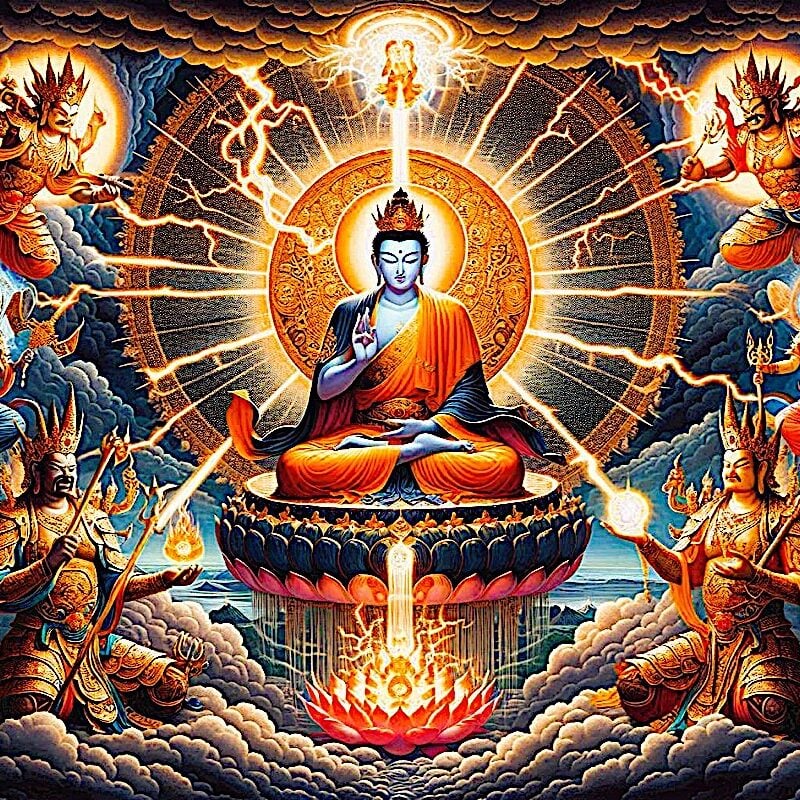
Protection from all Harm, Natural Disaster, Weather, Spirits, Evil, Ghosts, Demons, Obstacles: Golden Light Sutra: Chapter 14
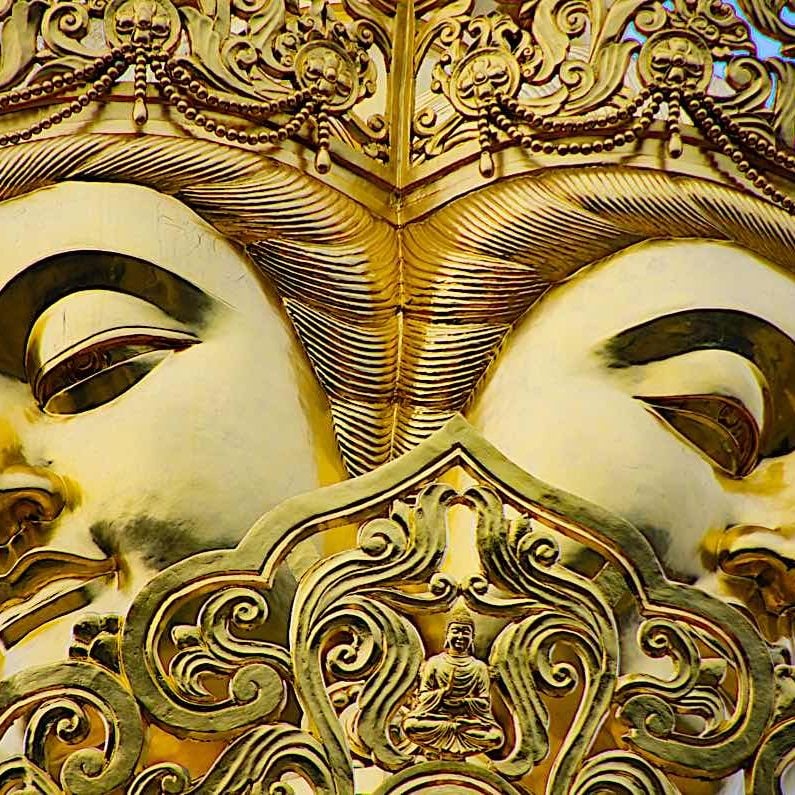
Samantabhadra’s The King of Prayers is the ultimate Buddhist practice how-to and itself a complete practice
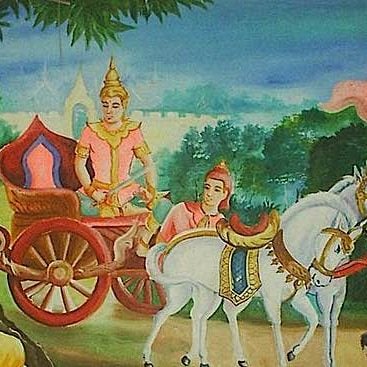
The Five Strengths and Powers or pañcabalā in Buddhism — the qualities conducive to Enlightenment: faith, energy, mindfulness, concentration and wisdom
Search
Latest Features
Please support the "Spread the Dharma" mission as one of our heroic Dharma Supporting Members, or with a one-time donation.
Please Help Support the “Spread the Dharma” Mission!

Be a part of the noble mission as a supporting member or a patron, or a volunteer contributor of content.
The power of Dharma to help sentient beings, in part, lies in ensuring access to Buddha’s precious Dharma — the mission of Buddha Weekly. We can’t do it without you!
A non-profit association since 2007, Buddha Weekly published many feature articles, videos, and, podcasts. Please consider supporting the mission to preserve and “Spread the Dharma." Your support as either a patron or a supporting member helps defray the high costs of producing quality Dharma content. Thank you! Learn more here, or become one of our super karma heroes on Patreon.
Lee Kane
Author | Buddha Weekly
Lee Kane is the editor of Buddha Weekly, since 2007. His main focuses as a writer are mindfulness techniques, meditation, Dharma and Sutra commentaries, Buddhist practices, international perspectives and traditions, Vajrayana, Mahayana, Zen. He also covers various events.
Lee also contributes as a writer to various other online magazines and blogs.




